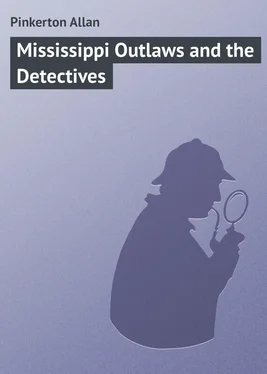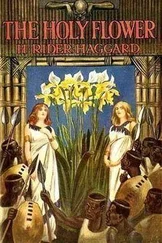Allan Pinkerton - Mississippi Outlaws and the Detectives
Здесь есть возможность читать онлайн «Allan Pinkerton - Mississippi Outlaws and the Detectives» — ознакомительный отрывок электронной книги совершенно бесплатно, а после прочтения отрывка купить полную версию. В некоторых случаях можно слушать аудио, скачать через торрент в формате fb2 и присутствует краткое содержание. Жанр: Классический детектив, foreign_detective, foreign_prose, foreign_language, на английском языке. Описание произведения, (предисловие) а так же отзывы посетителей доступны на портале библиотеки ЛибКат.
- Название:Mississippi Outlaws and the Detectives
- Автор:
- Жанр:
- Год:неизвестен
- ISBN:нет данных
- Рейтинг книги:3 / 5. Голосов: 1
-
Избранное:Добавить в избранное
- Отзывы:
-
Ваша оценка:
- 60
- 1
- 2
- 3
- 4
- 5
Mississippi Outlaws and the Detectives: краткое содержание, описание и аннотация
Предлагаем к чтению аннотацию, описание, краткое содержание или предисловие (зависит от того, что написал сам автор книги «Mississippi Outlaws and the Detectives»). Если вы не нашли необходимую информацию о книге — напишите в комментариях, мы постараемся отыскать её.
Mississippi Outlaws and the Detectives — читать онлайн ознакомительный отрывок
Ниже представлен текст книги, разбитый по страницам. Система сохранения места последней прочитанной страницы, позволяет с удобством читать онлайн бесплатно книгу «Mississippi Outlaws and the Detectives», без необходимости каждый раз заново искать на чём Вы остановились. Поставьте закладку, и сможете в любой момент перейти на страницу, на которой закончили чтение.
Интервал:
Закладка:
According to Carr, a man named John Witherspoon had visited him about six weeks before, and had asked him whether he would like to get a large sum of money. Carr replied affirmatively, of course, and wished to know how it could be obtained. Witherspoon had said that the express company could be robbed very easily by boarding a train at any water-tank, overpowering the messenger, and making him open the safe. Witherspoon also had said that he and several others had robbed a train at Moscow some weeks before, and that they had got only sixteen hundred dollars, but that they should do better next time. He had asked Carr to go to Cairo and find out when there would be a large shipment of money to the South; then Carr was to take the same train and give a signal to the rest of the party on arriving at the designated spot.
On hearing Carr's story, William sent him back to Moscow with instructions to renew his intimacy with Witherspoon, and to report any news he might learn at once; in case it should prove to be of any value, the company would pay him well for his services. It is hardly necessary to add that Mr. Carr, having failed to get, as he had hoped, a roving commission as detective at the company's expense, was not heard from again, his bonanza of news having run out very quickly on discovering that no money was to be paid in advance.
The next case was a more plausible one, and William began its investigation with the feeling that something might be developed therefrom. It was learned that a former express messenger named Robert Trunnion, who had been discharged several months before, had been hanging around Columbus, Kentucky, ever since. While in conversation with the clerk of a second-class hotel, Trunnion had spoken of the ease with which a few determined men could board an express car, throw a blanket over the messenger's head, and then rob the safe. The clerk said that Trunnion had made the suggestion to him twice, and the second time he had given Trunnion a piece of his mind for making such a proposition. Trunnion had then said he was only fooling, and that he did not mean anything by it. William learned that Trunnion was then engaged in selling trees for a nursery at Clinton, Kentucky, and that he was regarded as a half-cracked, boasting fool, who might be anything bad, if he were influenced by bold, unscrupulous men. William therefore paid a visit to Mr. Trunnion, whom he found to be a very high-toned youth, too fiery-tempered and sensitive to submit to any questioning as to his words or actions. In a very brief space of time, however, his lordly tone came down to a very humble acknowledgment that he had used the language attributed to him; but he protested that he had meant nothing; in short, his confession was not only complete, but exceedingly candid; he admitted that he was a gas-bag and a fool, without discretion enough to keep his tongue from getting him into trouble continually; and, having clearly shown that he was nowhere in the vicinity of either robbery, he asked humbly not to be held responsible for being a born idiot. William was satisfied that the fellow had told the truth, and, after scaring him out of all his high-toned pride, he let him go, with a severe lecture on the danger of talking too much.
On the nineteenth of November, when the identity of the robbers had been fully established, William was called away to Iuka, Mississippi, on information received from Mr. O'Brien, the general superintendent of the express company, that a man named Santon had seen the leader of the party in that place, just a week before. Santon represented that he knew the man well, having been acquainted with him for years in Cairo, and that he could not be mistaken, as he had spoken with him on the day mentioned. William found that the man Santon was a natural liar, who could not tell the truth even when it was for his interest to do so. The descriptions of the various robbers had been scattered broadcast everywhere, and none of them were represented as over thirty-five years of age; yet Santon said that his man was over fifty years old, and that he had been a pilot on the Mississippi for years. This was a case – not an infrequent one, either – where people talk and lie about a crime for the sole purpose of getting a little temporary notoriety. Owing to various accidents and railway detentions, William lost three days in going to hunt up this lying fellow's testimony.
Perhaps the most impudent of all the stories brought to the express company's officers was that of a man named Swing, living at Columbus, Kentucky. He sent a friend to Union City to tell them that he could give them a valuable clue to the identity of the robbers, and William accompanied this friend back to Columbus. On the way, William drew out all that Swing's friend knew about the matter, and satisfied himself that Swing's sole object in sending word to the officers of the company was to get them to do a piece of detective work for him. It appeared that his nephew had stolen one of his horses just after the robbery, and he intended to tell the company's officers that this nephew had been engaged in the robbery; then if the company captured the nephew, Swing hoped to get back his horse. A truly brilliant scheme it was, but, unfortunately for his expectations, William could not be misled by his plausible story; and, if he ever recovered his horse, he did so without the assistance of the express company. Nevertheless, he took William away from his work for nearly a whole day, at a time when his presence was almost indispensable.
Another peculiar phase of a detective's experience is, that while following up one set of criminals, he may accidentally unearth the evidences of some other crime; occasionally it happens that he is able to arrest the criminals thus unexpectedly discovered, but too often they take the alarm and escape before the interested parties can be put in possession of the facts. About two weeks after the Union City robbery, in the course of my extended inquiries by telegraph, I came across a pair of suspicious characters in Kansas City, Missouri. I learned that two fine-looking women had arrived in that city with about eight thousand dollars in five, ten, and twenty dollar bills, which they were trying to exchange for bills of a larger denomination. The women were well dressed, but they were evidently of loose character, and the possession of so much money by two females of that class excited suspicion instantly in the minds of the bankers to whom they applied, and they could not make the desired exchange. One of the women was a blonde and the other was a brunette. They were about of the same height, and they dressed in such marked contrast as to set each other off to the best advantage; indeed, their dresses seemed to have attracted so much attention that I could gain very little acquaintance with their personal appearance. I could not connect them in any way with the robbery at Union City, nor with any other recent crime, though I had little doubt that the money they had with them was the proceeds of some criminal transaction; still, having my hands full at that time, it would have been impossible for me to look after them, even had I thought best to do so. As it is my practice to undertake investigations only when engaged for the purpose by some responsible person, I did not waste any time in endeavoring to discover the source whence these women obtained their money; though, of course, had I learned enough about them to suspect them of complicity in any specific crime, I should have reported my suspicions to the parties interested, to enable them to take such action as they might have seen fit.
The most important of all the false clues brought out in this investigation was presented by a noted confidence man and horse-thief named Charles Lavalle, alias Hildebrand. I call it the most important, not because I considered it of any value at the time, but because it illustrates one of the most profitable forms of confidence operation, and because the express company, by refusing to accept my advice in the matter, were put to a large expense with no possibility of a return.
Читать дальшеИнтервал:
Закладка:
Похожие книги на «Mississippi Outlaws and the Detectives»
Представляем Вашему вниманию похожие книги на «Mississippi Outlaws and the Detectives» списком для выбора. Мы отобрали схожую по названию и смыслу литературу в надежде предоставить читателям больше вариантов отыскать новые, интересные, ещё непрочитанные произведения.
Обсуждение, отзывы о книге «Mississippi Outlaws and the Detectives» и просто собственные мнения читателей. Оставьте ваши комментарии, напишите, что Вы думаете о произведении, его смысле или главных героях. Укажите что конкретно понравилось, а что нет, и почему Вы так считаете.












